Oh, M. Night, you've done it again!
That doesn't have to mean something bad. Right? If I start off by declaring good ole M. Night Shyamalan has done it again I could simply mean he's successfully rediscovered the magic of Unbreakable's "what if superheroes were real and grounded?" storytellingand somehow merged it with the clever thrills and character dynamics of Split to create a satisfying conclusion to this most unlikely of film trilogies.
Yeaaaahhhh...remember, this is M. Night we're talking about. His name used to be synonymous with "the next big thing." Now it's more closely associated with "one-trick pony" or the following Robot Chicken meme:
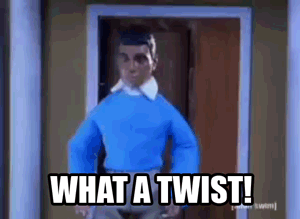
That's what happens when you build your brand around twist endings ( The Sixth Sense, Unbreakable, Signs) and never really find another gear, eventually annoying audiences ( The Village) before simply making them openly laugh in your face ( The Happening, aka, The One Where the Killer Turns out to Be Wind). Shyamalan tried branching out ( The Last Airbender, After Earth); it didn't take.
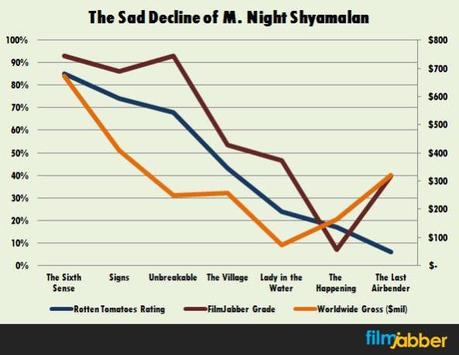
Now, he's taking a mortgage out on his house to help pay for smaller thrillers, and with The Visit and Split he managed to finally climb out of director's jail.
However, once bitten, twice shy. Shyamalan's admitted inability to know how to shoot compelling action scenes, a tendency toward overly ponderous pacing, wooden, expository dialogue, and struggles with telling the difference between a good twist ending and a bad one are just some of the weaknesses and regrettable tendencies he can slip back into at any moment. That, sadly, is what has happened here with the slow, muddled, overstuffed, and deeply disappointing Glass.
So, when I say of Glass that M. Night has done it again I don't mean it as a compliment. No. I mean the bad version of M. Night is back, which, truly, is such a shame. Unbreakable and Split are easily two of his best films, and Split and Glass are two of his most ambitious:
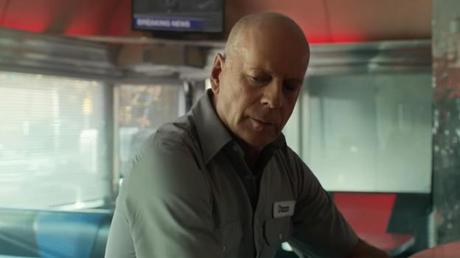
He didn't even tell Universal that Split, the movie they'd just funded, was part of the Unbreakable universe until shortly before its Fantastic Fest premiere. When they threw lawyers at him to explain he couldn't actually do that since Unbreakable is a Disney property he was two steps ahead of them; he'd already cleared it with Disney, who agreed on the condition that they would share distribution of any Split sequel with Universal.
That still left several crucial steps: 1) Split had to become a hit on its own merits since it was sold with a marketing campaign which kept the Unbreakable connection a secret. 2) Even if Split did that and made enough money to warrant a sequel, Unbreakable stars Samuel L. Jackson and Bruce Willis had to actually agree to come back for more than just a last-minute cameo. No, they would be equal co-stars to James McAvoy. Maybe they'd want more money. Maybe they'd demand to read a script first and then pass because they didn't like it.
Luckily for Shyamalan, that didn't happen. Jackson had been hounding Shyamalan to finally make his "motherfucking" Unbreakable sequels - it was always planned to be a trilogy - and didn't hesitate to join Glass. Neither did Willis. In fact, Willis didn't even read the script before signing up. Same goes for franchise newcomer Sarah Paulson, who adores Unbreakable, was just as floored as everyone else by Split's "Surprise, it's an Unbreakable sequel!" twist and lobbied to be part of whatever movie they were doing next.
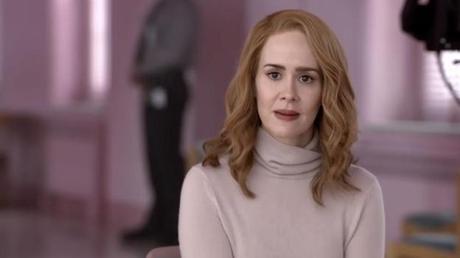
Here, Paulson plays Dr. Ellie Staple, a psychologist specializing in treating patients who believe they are superheroes. She doesn't exactly have a heavy patient load, though. As far as we can tell in Glass, it's just the three - Willis' David Dunn (a superstrong home security salesman whose vigilante alter ego goes by The Overseer), McAvoy's Kevin Wendell Crumb (a dissociative identity disorder-sufferer with 24 different personalities, one of them capable of amazing feats of strength), and Jackson's Elijah Price (a Lex Luthor-level supergenius stuck in a wheelchair due to brittle bones).
She seeks to help the patients see how deluded they are. Elijah, heavily sedated but still plotting away, seeks, as always, to convince the world superheroes exist. Dunn and Crumb, um, mostly just seek to fight each other again after their initial battle in the film's 20-minute opening ends in a draw. "How is it that there's someone out there who is just as strong as me?" they both seem to be wondering.
When all of this was laid out in the trailer, it certainly looked promising. In practice, however, and I know this isn't an exact comparison, it plays more like an especially bad version of one of those TV episodes where the main characters end up in a mental hospital and briefly believe everything on the show to that point was just in their head (See: Buffy, Smallville, Supernatural, The Magicians below). When done right, such a storyline can be interesting because it unsettles a character or characters, challenges them in an entirely new way, or at least changes things up for a week; when done wrong, it's just annoying. More the latter than the former here, sadly.
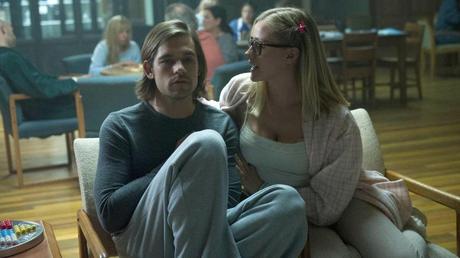
The entire dramatic arc of this movie is built around Dr. Staple's efforts to convince the main trio that they are just crazy, yet the script's heart never feels fully committed to this idea. As a result, everyone on screen and even behind the screen struggles to sell it, leaving us to simply wait impatiently for the inevitable showdown where, guess what, those super strong dudes we've already seen do super strong shit in prior movies face off to do, well, yet more super strong stuff again.
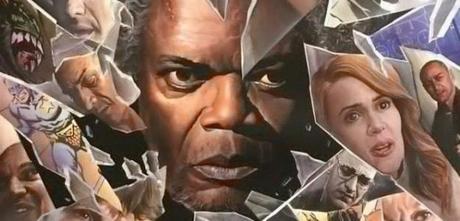
The larger effort, obviously, is to again try and deconstruct the superhero mythos ala Unbreakable. However, what seemed clever in 2000 just seems woefully behind the times now. Elijah, for example, rolling around in his Professor X wheelchair and calling out comic book tropes like he's the smartest kid in class just leaves you wanting to look at M. Night and ask, "You realize there have been like 100 superhero movies in the last 18 years, right? Jackson and McAvoy combined have been in over 15 of them. I think we're all up on the tropes by now."
While Shyamalan appears not to have updated his material as far as the superheroes are concerned, he at least continues to pull a masterful performance - performance s, actually - out of McAvoy, who portrayed just under 10 of Kevin's personalities in Split but ups the total to 20 in Glass. His scene partner from Split, Anya Taylor-Joy, is also back as Casey and their scenes together are easily among the most purely enjoyable, but they also add to the clutter.
Like most superhero team up movies, there are a lot of characters and storylines to juggle, and Shyamalan doesn't always keep the trains running smoothly, awkwardly jumping from Casey and Kevin to David and his son to Elijah and his mom. When all of these side characters just randomly show up at the hospital for the finale, you're left wondering if there was a scene we missed, an apt feeling for the entire film, really.
THE BOTTOM LINEMe in 2017: WTF, Split is secretly a super villain's origin story and now Bruce Willis has to stop him? That sounds awesome!
Me in 2019: Yeah, maybe they should have just made a straight Split sequel instead. All that Unbreakable stuff mostly gets in James McAvoy and Anya Taylor-Joy's way.
RANDOM PARTING THOUGHTBecause this a Blumhouse release through Universal and because it's a direct sequel to Split, there is clearly some desire to at least nod toward the horror side of things with an unsettling, moody West Dylan Thordson score that more gets in the way than helps.
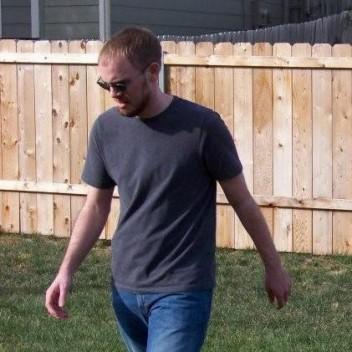
Grew up obsessing over movies and TV shows. Worked in a video store. Minored in film at college because my college didn't offer a film major. Worked in academia for a while. Have been freelance writing and running this blog since 2013. View all posts by Kelly Konda

